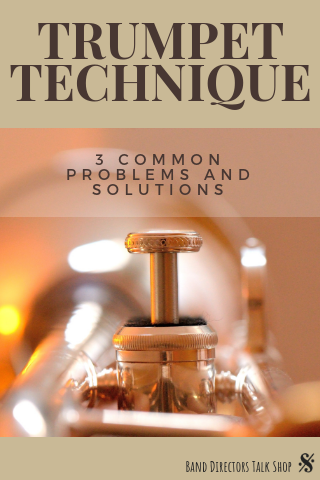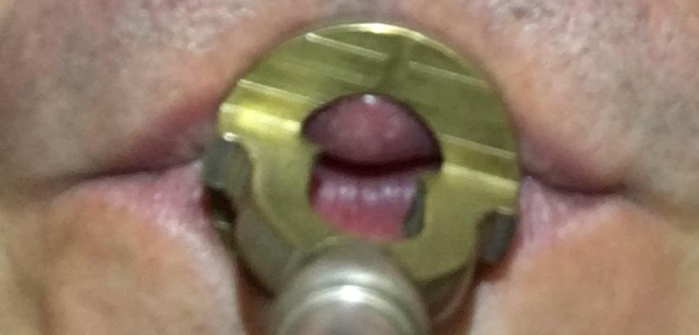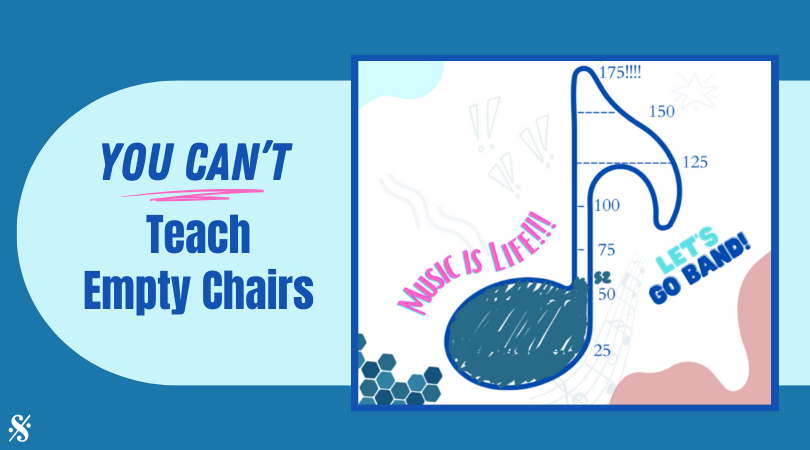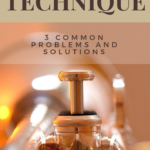Trumpet Technique: Three Common Problems and Suggested Solutions
Nearly all trumpet players will, at some point in the course of their studies, encounter occasional problems. These problems are temporary, in most cases, and are caused by different factors such as incorrect practice habits, lip sores, defective equipment, or illness. This article offers possible solutions to three of the most common problems:
- air in tone
- inability to play softly
- double buzz

1. Air in tone:
One of the most common issues encountered by band directors with their students is an airy tone. The lip aperture being too open may cause an airy or “fuzzy” tone. Playing too loud can lead to the aperture to be too open. Unfortunately, the loud playing that is often demanded within the marching band setting, if done incorrectly, could make this problem more obvious.
Too open lip aperture.

Small lip aperture.

This could be remedied by doing the exact opposite, practicing extremely softly. “Whisper” tones are very soft notes that are excellent to improve the tonal quality. They require the lip aperture to be as flat and small as possible.
To play whisper tones, the student should follow these steps:
- Begin on a comfortable register (Usually second-line G, or low C).
- Put the lips together and blow very gently until the chosen note starts to sound, without using the tongue (use air attack).
- Hold the note at a very soft dynamic.
- Practice scales, or fragments of scales, and simple lyrical passages as whisper tones.
Air in tone can also be caused by dry, chapped lips. If this is the case, a lip moisturizer product can be recommended to the student. It is advisable to use a product that does not contain petroleum-based ingredients, which might cause the lip to swell. The student should also maintain good hydration habits to prevent and treat dry, chapped lips.
Defective equipment can also cause air in tone. Teachers/directors and students should be aware of dirty instruments or mouthpieces, corrosion in the mouthpieces or instruments, or air leakage in instruments (usually because of defective water key corks).
2. Inability to play softly:
The inability to play very softly could also be caused by the lip aperture being too open. Again, the “whisper” tones are great for improving response and clarity of tone by reducing the aperture of the lips.
Buzzing the lips and mouthpiece are excellent exercises to build strength, and to improve the ear – lip coordination. However, these exercises can cause tension if done incorrectly. Soft playing becomes difficult, and the tone might become “pinched,” if the lips are not relaxed when playing the instrument.
Dry, chapped lips could also be the reason for the inability to play softly. Additionally, swollen lips or excessive mouthpiece pressure can be the cause of this issue.
- A correct warm-up is important to prevent and reduce lip swelling.
- Proper puckering of the embouchure, and avoiding excessive mouthpiece pressure which cuts off blood flow to the lips, can also prevent swelling.
- It is also extremely important to incorporate many short rest periods during practice and performance.
3. Double buzz:
Double buzz is an extra pitch in the sound that distorts the tone quality. Swollen lips are also one of the most common causes of this phenomenon. Besides the reasons above mentioned, the lips can also swell because of allergies, spicy foods, viral infections (cold or flu), sunburn, and petroleum-based lip balms.
Other causes of double buzz include embouchure fatigue, change in size/shape of the mouthpiece, change in the angle of the mouthpiece on the lips, dry lips (usually because of sunburn or cold weather), and excessive or uneven mouthpiece pressure.
It is important to note that when the double buzz is caused by sore lips because of excessive playing, the player might unconsciously tilt the mouthpiece to an odd angle to relieve the pressure on the sore area. If this occurs, the best remedy is to rest.
Oswaldo Zapata is the Assistant Professor of Trumpet and Mariachi Director at Texas A&M International University. He has studied trumpet under Prof. David Hickman, Prof. James Ackley, Mr. Allen Vizzutti, and Prof. Fernando Parra. Dr. Zapata earned a Doctorate of Musical Arts (DMA) in Trumpet Performance from Arizona State University, where he was a Graduate Teaching Assistant for both the Mariachi program and Trumpet Studio. He also holds a Master of Music in Trumpet Performance and a Certificate of Graduate Study in Music Performance from the University of South Carolina, and a Bachelor of Music in Performance with an Emphasis in Instrumental Pedagogy from the Universidad Nacional de Colombia. Dr. Zapata performs as Principal Trumpet of the Laredo Philharmonic Orchestra. He lives in Laredo, TX with his wife and son.
Related Reading:
A Systematic Approach to Improving Trumpet Tone Quality
Avoiding the Most Common Pitfall- Tension
Trumpet Embouchure Basics
If you would like to receive our weekly newsletter, sign up here.
Don’t forget to like us on Facebook too!
Learn. Share. Inspire.
BandDirectorsTalkShop.com






Leave a Reply
You must be logged in to post a comment.